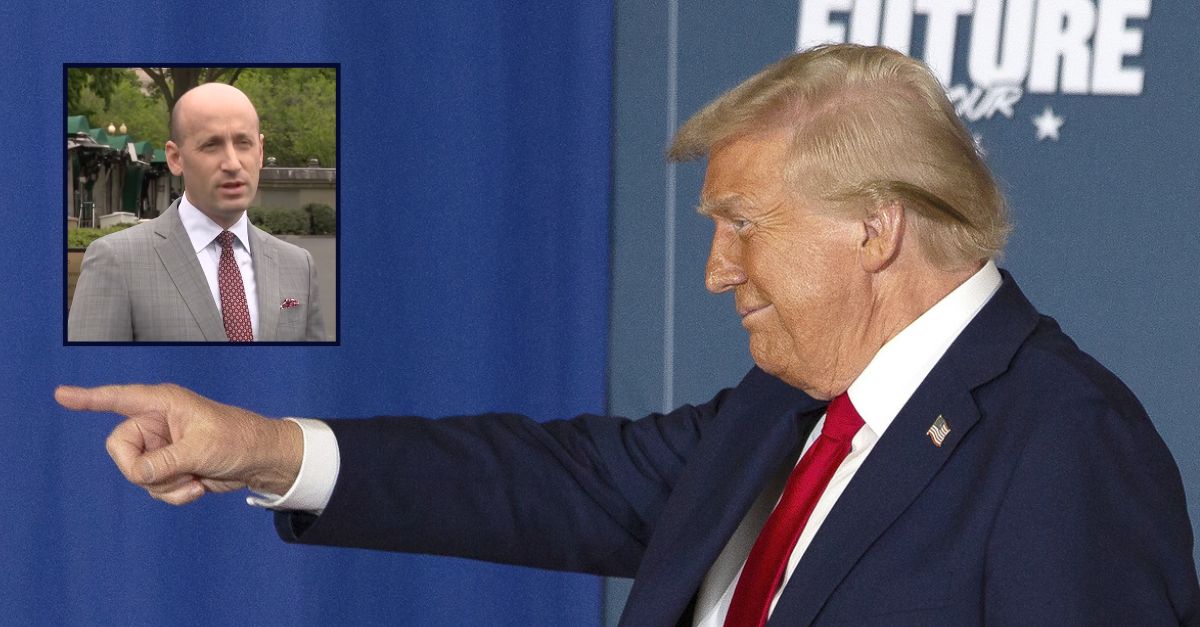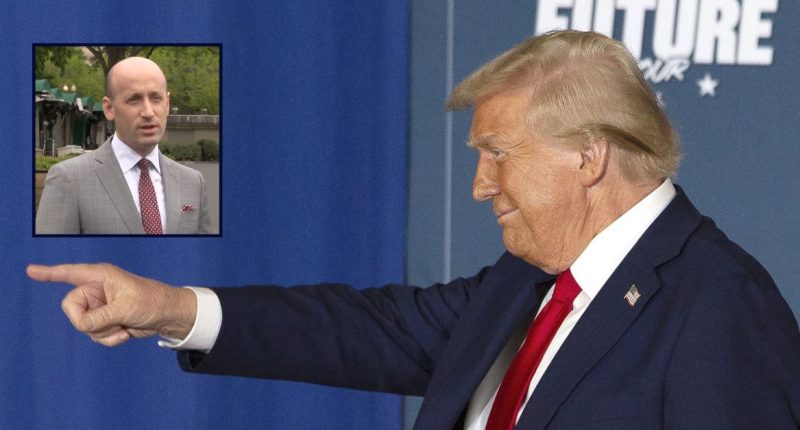
Inset: Stephen Miller answers questions about immigration (C-SPAN). Background: President Donald Trump attends the Building America’s Future, Southeastern Pennsylvania Roundtable at the Drexelbrook Event Center on Oct. 29, 2024, in Drexel Hill, Pennsylvania (Matt Bishop/imageSPACE/Sipa USA via AP Images).
The Trump administration‘s floated discussion of suspending the writ of habeas corpus immediately drew strong condemnation in the legal community.
Late Friday, C-SPAN broadcast top White House adviser Stephen Miller saying the government was “actively looking at” suspending the writ, adding that it “depends on whether the courts do the right thing or not.” Then, CNN confirmed the seriousness of those comments by reporting that “two people familiar with the consideration” said President Donald Trump himself was involved in such conversations.
Miller’s comments made clear what the 45th and 47th president alluded to during a press briefing in late April — that the Trump administration is increasingly frustrated with court orders barring the summary deportation of undocumented immigrants under the Alien Enemies Act.
“[T]he short version is that the Founders were hell-bent on limiting, to the most egregious emergencies, the circumstances in which courts could be cut out of the loop,” Georgetown University Law Prof. Steve Vladeck wrote on his blog. “To casually suggest that habeas might be suspended because courts have ruled against the executive branch in a handful of immigration cases is to turn the Suspension Clause entirely on its head.”
Love true crime? Sign up for our newsletter, The Law&Crime Docket, to get the latest real-life crime stories delivered right to your inbox.
The law professor went on to say Miller was “wrong” about the conditions necessary to revoke habeas under the U.S. Constitution.
“Well, the Constitution is clear,” Miller said. “And that, of course, is the supreme law of the land, that the privilege of the writ of habeas corpus can be suspended in a time of invasion.”
Vladeck’s response to that claim goes on, at length [emphasis in original]:
The Suspension Clause does not say habeas can be suspended during any invasion; it says “The Privilege of the Writ of Habeas Corpus shall not be suspended, unless when in Cases of Rebellion or Invasion the public Safety may require it.” This last part, with my emphasis, is not just window-dressing; again, the whole point is that the default is for judicial review except when there is a specific national security emergency in which judicial review could itself exacerbate the emergency. The emergency itself isn’t enough.
The writ of habeas corpus is a 900-year-old legal protection afforded to persons against authoritarian impulses of law enforcement and government executives which allows an advocate to argue someone is being illegally confined, detained or imprisoned. It is generally considered the bedrock of the American and British legal systems.
The writ also attempts to force the government to answer questions in court and account for its actions by forcing an administrative process on, for example, the detention and deportation of immigrants.
In recent weeks, habeas became relevant to the current immigration debate after the Trump administration, in violation of a court order, flew planes full of immigrant detainees to a notorious prison in El Salvador. Preemptively, attorneys with the American Civil Liberties Union (ACLU) warned that the deportations would violate habeas corpus, along with various other rights.
As litigation fanned out in the aftermath of those summary deportations, courts increasingly moved to stop the government from any repeat behavior, largely agreeing with the ACLU’s analysis. On April 7, the U.S. Supreme Court unanimously agreed the government could not use the AEA without due process and prescribed the use of habeas corpus petitions to litigate detention under the obscure wartime law. Then, on April 19, the high court issued an exceedingly atypical Saturday ruling ordering the government “not to remove” a certain group of immigrants “until further order.”
The Trump administration’s proposal, however informal, is seen as an attempted end-run around the Supreme Court itself.
Legal experts blasted the prospect in no uncertain terms.
“Congress has the authority to suspend habeas corpus. Not Stephen Miller, not the president,” election law attorney Marc Elias said during an appearance on MSNBC. “Stephen Miller is wrong on the law, he’s wrong on the facts. But what he is is the representative of a deranged authoritarian.”
Miller, for his part, did not explicitly say Trump would be the one attempting to suspend habeas corpus.
Vladeck criticized this omission: “Miller also doesn’t deign to mention that the near-universal consensus is that only Congress can suspend habeas corpus — and that unilateral suspensions by the President are per se unconstitutional.”
While legal scholars generally do believe presidents themselves lack the power to suspend the writ, habeas corpus was famously and repeatedly suspended by Abraham Lincoln during the Civil War. Later, Ulysses S. Grant suspended habeas corpus under a specific section of the Civil Rights Act of 1871. The writ was also suspended by the governor of Hawaii, when it was not yet a state, during World War II.
Trump appeared to reference those instances last month in response to a question about nationwide injunctions and their impact on deportations.
“Well, there are ways to mitigate it,” the president said. “And there’s some very strong ways is one way that’s been used by three very highly respected presidents. But we hope we don’t have to go that route. But there is one way that has been used very successfully by three presidents, all highly respected. And hopefully we don’t have to go that way. But there are ways of mitigating that.”









